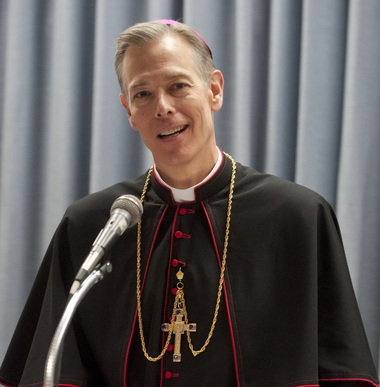Portland's New Catholic Archbishop Weighs in on Transparency and Clergy Abuse
By Nancy Haught
The Most Rev. Alexander K. Sample, the next Catholic Archbishop of Portland, says he will be as transparent as he can about cases of sexual clergy abuse. Sample, who spent a few days in Portland this week, returned to Michigan yesterday, where he's been bishop of the Diocese of Marquette for the past seven years. In a telephone interview, he talked about some of the serious challenges he'll face as he tries to shepherd a geographical area twice the size of his diocese with more than four times as many Catholics. People inside and outside the church are wondering about his philosophy toward accusations of clerical abuse. He also talked about his "obvious fondness for traditional liturgy," the role of women in the church and Catholics who are critical of official church teaching. More of his interview is coming. Here's an excerpt: Q: A priest of the Archdiocese of Portland is facing criminal charges related to sexual abuse. What does an archdiocese owe to a priest in that position? For example, is it appropriate for an archdiocese to give or lend an accused priest money to cover his defense? A: I don't think it would be appropriate for me to comment on that situation. I'm not the archbishop there yet and don't know all the details. But I can answer from my own experience. A lot of people in the church don't understand the implications of what we call incardination, the attachment of a priest to a diocese. The church has certain obligations. If a priest is completely dismissed from the clerical state, the responsibility of the archdiocese ceases. But if he is removed from ministry but not dismissed from the clerical state, canon law requires that the church provide some sustenance, some decent support of living to that person. Not that we have to support them in luxury, by any means, but health insurance and a minimal stipend to live on is required. Many of these men are elderly and not able to find other employment. This causes great concern from people used to a more secular mode, where a person is fired and you're done with him, you have no other responsibility. Q: The Survivors Network of those Abused by Priests, or SNAP, says you've "done nothing to distinguish" yourself "from the overwhelming majority of Catholic officials who continue to minimize and hide clergy sex crimes." How could you be more transparent in regard to this issue? It's a very tricky minefield I have to navigate. There are competing interests at stake. First and foremost are the interests of those who have been victimized. But there are also the interests of the accused. We live in a system, in a church, where the accused has a right to defense. And, in civil cases, we have to be concerned for the patrimony of the diocese and the interests of the folks in the pews. Sometimes the bishop is in the middle. People are angry because he hasn't done enough for the victims or hasn't been just to the priest. Parishioners are mad because we've removed their beloved pastor and the charges couldn't possibly be true and why are they bringing it up 25 years later. And the issues of confidentiality and the right to privacy apply to victims as well. When I say transparency, I mean to be as open as we can, saying as much as we can, keeping people as informed as we can without getting into confidential details. If a priest is removed for some kind of misconduct, we used to say he had health issues, that father was going to get some help or that he was burned out. In the past, we wouldn't give the reasons. That's what we have to get over. If father is removed because of an accusation, we need to tell the people straight out, not try to sugar coat it. They are adults, they have a right to know this information. I've visited parishes where a priest has been removed and parishioners are all over the board. They're angry, confused. We need to explain the process to them and we can't afford to forget about the victims, they need to be informed and brought along through the process.
|
.
Any original material on these pages is copyright © BishopAccountability.org 2004. Reproduce freely with attribution.
